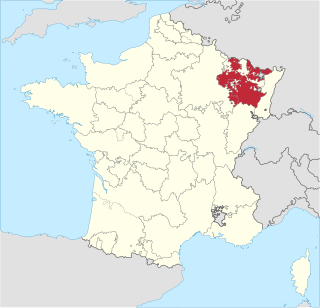Related Research Articles
In law, an answer was originally a solemn assertion in opposition to someone or something, and thus generally any counter-statement or defense, a reply to a question or response, or objection, or a correct solution of a problem.
Simony is the act of selling church offices and roles or sacred things. It is named after Simon Magus, who is described in the Acts of the Apostles as having offered two disciples of Jesus payment in exchange for their empowering him to impart the power of the Holy Spirit to anyone on whom he would place his hands. The term extends to other forms of trafficking for money in "spiritual things".
In criminal law, mens rea is the mental state of a defendant who is accused of committing a crime. In common law jurisdictions, most crimes require proof both of mens rea and actus reus before the defendant can be found guilty.

Charades is a parlor or party word guessing game. Originally, the game was a dramatic form of literary charades: a single person would act out each syllable of a word or phrase in order, followed by the whole phrase together, while the rest of the group guessed. A variant was to have teams who acted scenes out together while the others guessed. Today, it is common to require the actors to mime their hints without using any spoken words, which requires some conventional gestures. Puns and visual puns were and remain common.
Robbery is the crime of taking or attempting to take anything of value by force, threat of force, or by use of fear. According to common law, robbery is defined as taking the property of another, with the intent to permanently deprive the person of that property, by means of force or fear; that is, it is a larceny or theft accomplished by an assault. Precise definitions of the offence may vary between jurisdictions. Robbery is differentiated from other forms of theft by its inherently violent nature ; whereas many lesser forms of theft are punished as misdemeanors, robbery is always a felony in jurisdictions that distinguish between the two. Under English law, most forms of theft are triable either way, whereas robbery is triable only on indictment. The word "rob" came via French from Late Latin words of Germanic origin, from Common Germanic raub "theft".

Under the Ancien Régime, the Kingdom of France was subdivided in multiple different ways into several administrative units, until the National Constituent Assembly adopted a more uniform division into departments (départements) and districts in late 1789. The provinces continued to exist administratively until 21 September 1791.

Sir William Blackstone was an English jurist, justice and Tory politician most noted for his Commentaries on the Laws of England, which became the best-known description of the doctrines of the English common law. Born into a middle-class family in London, Blackstone was educated at Charterhouse School before matriculating at Pembroke College, Oxford, in 1738. After switching to and completing a Bachelor of Civil Law degree, he was made a fellow of All Souls College, Oxford, on 2 November 1743, admitted to Middle Temple, and called to the Bar there in 1746. Following a slow start to his career as a barrister, Blackstone became heavily involved in university administration, becoming accountant, treasurer and bursar on 28 November 1746 and Senior Bursar in 1750. Blackstone is considered responsible for completing the Codrington Library and Warton Building, and simplifying the complex accounting system used by the college. On 3 July 1753 he formally gave up his practice as a barrister and instead embarked on a series of lectures on English law, the first of their kind. These were massively successful, earning him a total of £453, and led to the publication of An Analysis of the Laws of England in 1756, which repeatedly sold out and was used to preface his later works.

In law, a verdict is the formal finding of fact made by a jury on matters or questions submitted to the jury by a judge. In a bench trial, the judge's decision near the end of the trial is simply referred to as a finding. In England and Wales, a coroner's findings used to be called verdicts but are, since 2009, called conclusions.

The term "Cavalier" was first used by Roundheads as a term of abuse for the wealthier royalist supporters of Charles I of England and his son Charles II during the English Civil War, the Interregnum, and the Restoration. It was later adopted by the Royalists themselves. Although it referred originally to political and social attitudes and behaviour, of which clothing was a very small part, it has subsequently become strongly identified with the fashionable clothing of the court at the time. Prince Rupert, commander of much of Charles I's cavalry, is often considered to be an archetypal Cavalier.

In Imperial Russia, a ukase or ukaz was a proclamation of the tsar, government, or a religious leadership that had the force of law. "Edict" and "decree" are adequate translations using the terminology and concepts of Roman law.

A vedette is a mounted sentry or picket, who has the function of bringing information, giving signals or warnings of danger, etc., to a main body of troops. In modern terms, the soldiers who man listening-posts are the equivalent of vedettes.

Sir Nicholas Hyde was Lord Chief Justice of England.
Demise is an Anglo-Norman legal term for the transfer of an estate, especially by lease. It has an operative effect in a lease, implying a covenant "for quiet enjoyment."
Misprision in English law describes certain kinds of offence. Writers on criminal law usually divide misprision into two kinds: negative and positive.

William Gordon, 6th Viscount of Kenmure and Lord Lochinvar was a Scottish Jacobite.
Detainer ; originally in British law, the act of keeping a person against his will, or the wrongful keeping of a person's goods, or other real or personal property. A writ of detainer was a form for the beginning of a personal action against a person already lodged within the walls of a prison; it was superseded by the Judgments Act 1838.
Procès-verbal is a legal term with a number of meanings:

Lorraine and Barrois was a government of the Kingdom of France, formed in February 1766 from the duchies of Lorraine and Bar upon the death of Stanisław Leszczyński.
On the early morning of 31 May 2001, 17-year-old national footballer Sulaiman bin Hashim, along with his two friends were attacked by a group of eight youths from gang 369, known as Salakau, as they were walking along South Bridge Road, Clarke Quay, Singapore. Sulaiman was grievously assaulted by the gang while his two friends managed to escape. During the assault, Sulaiman sustained 13 stab wounds and two of them were fatal; he died as a result. The case was classified as murder and within the next 13 months, six of the gang members involved were arrested and eventually sentenced to jail and caning for culpable homicide, rioting and voluntarily causing grievous hurt. However, till today, the remaining two assailants were never caught.

Life imprisonment is a legal penalty in Singapore. This sentence is applicable for more than forty offences under Singapore law, such as culpable homicide not amounting to murder, attempted murder, kidnapping by ransom, criminal breach of trust by a public servant, voluntarily causing grievous hurt with dangerous weapons, and trafficking of firearms, in addition to caning or a fine for certain offences that warrant life imprisonment.